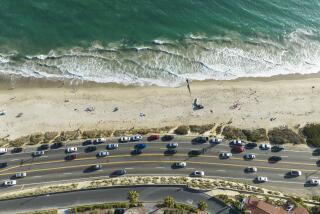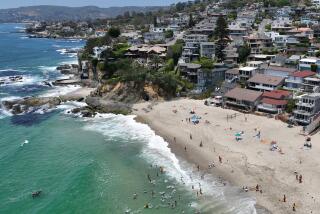Volunteers Find Beaches Not as Fouled as Feared
NEWPORT BEACH â From the early scenes on television Thursday night, Marcelo Beleber expected to find ugly clumps of crude, black-tarred animals and general desecration of his favorite roller-skating beaches.
What the 18-year-old Huntington Beach man actually found this morning when he hit the Newport shoreline with absorbent pads was by comparison a relief: a faint trail of black along the shore where perhaps less than a hundred gallons of oil had struck early the night before.
âItâs not so bad,â Beleber said with a smile as he worked on a spot of black just south of the Newport Pier, coming across occasional clumps of black goo. âThey must have done a good job cleaning it up last night. I was expecting a lot worse.â
On one of the oddest beach days ever, hundreds of cleanup workers, volunteers, curiosity seekers, reporters and camera crews--and even a few would-be entrepreneurs giving away promotional cleaning supplies--swarmed the sands around the pier to see what the southern tip of this weekâs 300,000-gallon oil spill had left on their beaches.
Most seemed relieved by what they saw.
Beach-goers agreed that any marring of the coastline was a tragedy--both environmentally and psychologically in a community that holds its beaches sacred; but, many said as they surveyed the scene, it could have been worse.
The oil was visible in a jagged, faint swath of black, a few feet wide, that paralleled the shore. A few foamy oil bubbles remained from the night before. And the light smell of petroleum hit the air--barely distinguishable, a few remarked, from the normal beach aromas of brine, fish and doughnuts.
Their observations jibed with reports from environmental officials who said that the impact of the oil hitting both Huntington and Newport beaches appeared relatively minor, and that the most sensitive coastal areas--such as Bolsa Chica wetlands and wildlife reserve--had not been affected so far.
But even amid the relief that marked the sunny morning, there was anger. Around noon, word began to spread through the waves of cleanup volunteers about the unthinkable: they were not wanted there.
Cleanup coordinators with British Petroleum, which leased the ill-fated American Trader, told volunteers they were worried that people along the shore were exposing themselves to risk because they were not properly trained or outfitted for the venture.
The official cleanup crews, some of whom said they were paid $12 an hour, wore bright yellow slickers, gloves and boots, and had reportedly been told just how to carry out the cleanup, officials said.
âIf somebody goes out there and gets hurt, thatâs a liability issue for us,â said Charles Webster of British Petroleum.
More to Read
Sign up for Essential California
The most important California stories and recommendations in your inbox every morning.
You may occasionally receive promotional content from the Los Angeles Times.










